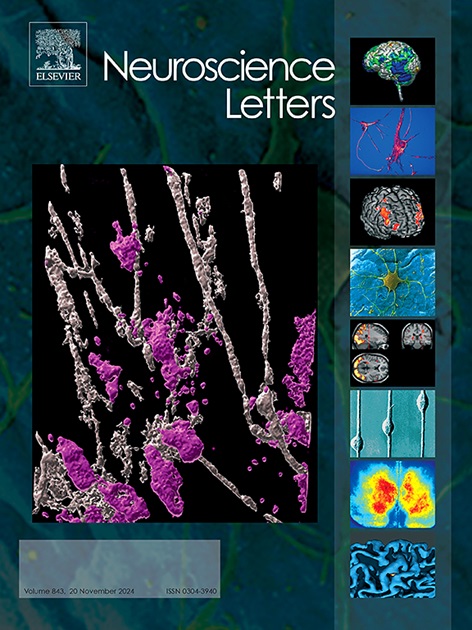言语前听觉调制是否反映了与反馈监测或言语运动规划有关的过程?
IF 2.5
4区 医学
Q3 NEUROSCIENCES
引用次数: 0
摘要
以往的研究表明,听觉处理过程会在言语开始前的计划阶段受到调节。迄今为止,这种言语前听觉调制(PSAM)的功能相关性仍然未知。在这里,我们研究了语音前听觉调制是否反映了与听觉皮层准备优化反馈监测相关的神经元过程,这反映在在线语音纠正中。结合先前数据集中的脑电 PSAM 数据和对同一参与者的语音进行的新声学测量,我们探讨了在 /b/-vowel-/d/ 单词发音过程中,单个说话者的 PSAM 程度是否与元音内发音调整的实施相关。在线发音调整被量化为从元音起始点到元音中点之间的试音间位变异性的变化程度(一种被称为居中的现象)。通过这种方法,我们还可以分别考虑元音起始点和元音中点的试音间位变异及其与 PSAM 的可能关系。结果显示,元音中点时的试音间声母变异性明显小于元音开始时。作为元音内部调整的指标,PSAM 与这一变异量的变化没有明显的相关性。令人惊讶的是,PSAM 不仅与元音中点的试音间变异性呈负相关,而且还与元音起始点的试音间变异性呈负相关。因此,PSAM 越大的说话者,其元音起始处的变异性就越小。研究结果表明,PSAM 可能反映了早在元音开始时就影响语音声学的过程,因此直接参与了运动指令准备(前馈控制)而非输出监测(反馈控制)。本文章由计算机程序翻译,如有差异,请以英文原文为准。
Does pre-speech auditory modulation reflect processes related to feedback monitoring or speech movement planning?
Previous studies have revealed that auditory processing is modulated during the planning phase immediately prior to speech onset. To date, the functional relevance of this pre-speech auditory modulation (PSAM) remains unknown. Here, we investigated whether PSAM reflects neuronal processes that are associated with preparing auditory cortex for optimized feedback monitoring as reflected in online speech corrections. Combining electroencephalographic PSAM data from a previous data set with new acoustic measures of the same participants’ speech, we asked whether individual speakers’ extent of PSAM is correlated with the implementation of within-vowel articulatory adjustments during /b/-vowel-/d/ word productions. Online articulatory adjustments were quantified as the extent of change in inter-trial formant variability from vowel onset to vowel midpoint (a phenomenon known as centering). This approach allowed us to also consider inter-trial variability in formant production, and its possible relation to PSAM, at vowel onset and midpoint separately. Results showed that inter-trial formant variability was significantly smaller at vowel midpoint than at vowel onset. PSAM was not significantly correlated with this amount of change in variability as an index of within-vowel adjustments. Surprisingly, PSAM was negatively correlated with inter-trial formant variability not only in the middle but also at the very onset of the vowels. Thus, speakers with more PSAM produced formants that were already less variable at vowel onset. Findings suggest that PSAM may reflect processes that influence speech acoustics as early as vowel onset and, thus, that are directly involved in motor command preparation (feedforward control) rather than output monitoring (feedback control).
求助全文
通过发布文献求助,成功后即可免费获取论文全文。
去求助
来源期刊

Neuroscience Letters
医学-神经科学
CiteScore
5.20
自引率
0.00%
发文量
408
审稿时长
50 days
期刊介绍:
Neuroscience Letters is devoted to the rapid publication of short, high-quality papers of interest to the broad community of neuroscientists. Only papers which will make a significant addition to the literature in the field will be published. Papers in all areas of neuroscience - molecular, cellular, developmental, systems, behavioral and cognitive, as well as computational - will be considered for publication. Submission of laboratory investigations that shed light on disease mechanisms is encouraged. Special Issues, edited by Guest Editors to cover new and rapidly-moving areas, will include invited mini-reviews. Occasional mini-reviews in especially timely areas will be considered for publication, without invitation, outside of Special Issues; these un-solicited mini-reviews can be submitted without invitation but must be of very high quality. Clinical studies will also be published if they provide new information about organization or actions of the nervous system, or provide new insights into the neurobiology of disease. NSL does not publish case reports.
 求助内容:
求助内容: 应助结果提醒方式:
应助结果提醒方式:


